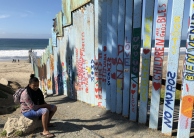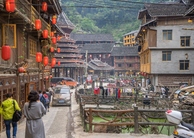From Cornell International Affairs Review VOL. 2 NO. 2Human Rights in Indonesia: The Consequences of Discrepancies in Domestic Versus International LawConclusionCan This Problem Be Resolved?Although many countries are plagued with the presence of a natural resource, known as the resource curse, because the resource results in fraud and civil war, there are a few examples where a natural resource has actually benefited the country. Norway has "avoided the worst manifestations of the resource curse" (Karl 484), because before it began exploiting its natural resource it had a means of controlling the influx of wealth. Good institutions must be in place prior to the exploitation of oil. Good governance, transparency and participation are prerequisites for the effective utilization of petrodollars to alleviate poverty and prevent conflict—not the other way around. (Karl 485) Here Karl highlights the importance of having a stable, democratic government established prior to exploring and utilizing a country's natural resource for the betterment of the country. If a country decides to exploit the resource prior to having these institutions in place, foreign investment and the individuals responsible for administering the government are likely to corrupt the system, by establishing laws and practices that benefit the ruling elite. Norway provides the world with an example of how natural resources can result in high profits that benefit the entire population. It ranked first out of 177 countries in the United Nations Human Development Report 2006. Norway's Human Development Index was .965, which measures "three dimensions of human development:…life expectancy…adult literacy and enrolment at the primary, secondary, and tertiary level…and by purchasing power, PPP, income" (UNDP). In addition, Norway is using "the money [from the oil revenues] to advance an ambitious ethical code they established in 2004 for their oil reserves, known as the Government Pension Fund" (Landler 1). It is pulling investments from countries whose actions they deem unethical. Already Norway has sold off more than $400 million in shares from Wal-Mart. It has blacklisted Boeing and Lockheed Martin, and Freeport McMoRan, which Norway accuses of severe environmental damage at its copper and gold mine in Indonesia. Freeport responded to the allegations with a 25-page, point-by-point rebuttal. Norway's report, it said, ‘is utterly false and bears no resemblance to our company and its operations.' (Landler 1) Norway clearly has significant power due to its oil reserves. It is using its dramatic rise in power in order to advance ethical practices within its own legal domain and of other countries by withdrawing or investing support in companies. Norway is redefining how governments choose to invest in companies. Hopefully, Norway's influence on the global economy will have lasting effects and set a precedent for the way governments select companies to support. Although Norway's actions are liberal and progressive, corrupt relationships between companies and countries rich with natural resources will continue to plague international society. Although this is a complex issue to resolve, there are several ways to combat this problem and end the conflict between the laws of the home and the host countries . One proposal is to have the United States monitor its companies operations abroad more effectively, to ensure that they are abiding by United States legislation. This would be more of a guarantee that if a company were engaging in illegal activities, the United States would be capable of trying and punishing them appropriately. Depending on domestic regulation may be more effective in restricting transnational companies because in the past, international resolutions have not always been successful monitoring them. However, this potential solution has several flaws, because it is already established that the United States does not have strict enough laws to monitor the companies operations abroad. In addition, if the United States is the sole country to pass an act concerning company's operations abroad, the problems of corruption, continued environmental degradation, and human rights abuses are not going to end; also, domestic policies will try to benefit the home country, and therefore may not be as stringent as necessary to protect the rights of the indigenous population of the host country or its environment. Therefore, a second idea, of establishing an international standard, may be the most effective means to solve this problem. Although international resolutions can be weak because regulation is difficult, companies may be less likely to defy or attempt to circumvent them for fear of their reputations or of the repercussions in international communities. Another method is simply to boycott the companies that continue to violate international standards, on an individual and government level, as exhibited by Norway; oil companies that do not adhere to the "best practices" (Karl 484), in terms of ethical standards will be boycotted. If the boycotts were sufficiently well organized, they might significantly deter misconduct by companies. Freeport provides a striking example of a company that has utilized the discrepancies in the United Statesí and Indonesian legislation to its their advantage. It is the international communityís responsibility to punish these companies for their unjust actions. Failure to do so makes the international community complicit in the abuse or indigenous populations and the environment. The global community needs to create stricter legislation to prevent companies from turning mountains into billions of tons of waste. If the international community does not act, it invites a future in which we hasten ìour own demise by destroying [our] natural resources and producing uncontrollable amounts of waste" (Reece 231). If we are able to develop ìa moral attitude toward the natural world, then . . . we would recognize the natural world not merely as a resource, but as something much more profoundówhat Thoreau liked to call the Poem of Creation" (Reece 232), sparing humanity from oblivion. ReferencesHills, Jonathan, and Richard Welford. “Case Study: Auditing for Human Rights: Freeport- McMoRan Copper and Gold in Papua.” Wiley InterScience (2006): 108-114. Academic Search Premier. Stanford University, Stanford. 3 May 2007. Keyword: Freeport. Johnson, Andrew, and Max Jarman. “Criticism Circles Indonesian Mine.” The Arizona Republic 21 Nov. 2006, sec. D: 1. Global Newsbank. Stanford University, Stanford. 6 June 2007. Karl, Terry L. The Political Challenge of Escaping the Resource Curse: the Case for a Transparent Fiscal Social Contract. Stanford University. Palo Alto: Stanford University. 465-494. Landler, Mark. “Norway Backs Its Ethics with Its Cash.” The New York Times 4 May 2007: 1. Global Newsbank. Stanford University, Stanford. 6 June 2007. Leith, Denise. The Politics of Power. Honolulu: University of Hawaii, 2003. Mealey, George A. Grasberg: Mining the Richest and Most Remote Deposit of Copper and Gold in the World, in the Mountains of Irian Jaya, Indonesia (New Orleans: Freeport-McMoRan Copper and Gold, 1996), p.71 McMillan, John. Promoting Transparency in Angola. Journal of Democracy. Johns Hopkins UP, 2005. 24 May 2007 <http://muse.jhu.edu/journals/journal_of_democracy/v016/16.3mcmillan.html>. Mikesell, Raymond F. Foreign Investment in Mining Projects. Cambridge: Oelgeschlager, Gunn & Hain, Inc. Photos courtesy of: “Freeport McMoRan’s Grasberg Mine operations destroy the Papua landscape.” Amnesty International. 4 April 2009. <http://www.amnestyusa.org/justearth/indonesia.html>. “Suharto.” 1 Jun. 1989. Associated Press. 4 Apr. 2009. <http://apimages.ap.org/OneUp.aspx?st=k&kw=suharto&showact=results&sort=relevance &intv=None&sh=10237&kwstyle=and&adte=1238878773&pagez=20&rids=8d1cbb2544e5da11af9f0014c2589dfb&dbm=PY2000&page= 1&xslt=1&dispname=890601070%2C%20INDONESIA>. Swaine, Emily.“Mangrove from Southeast Asia and palm oil plantation.” Association for Tropical Biology and Conservation. 4 April 2009. <http://www.atbc2008.org/news/20.htm>. Suggested Reading from Inquiries Journal
Inquiries Journal provides undergraduate and graduate students around the world a platform for the wide dissemination of academic work over a range of core disciplines. Representing the work of students from hundreds of institutions around the globe, Inquiries Journal's large database of academic articles is completely free. Learn more | Blog | Submit Latest in Law & Justice |

















